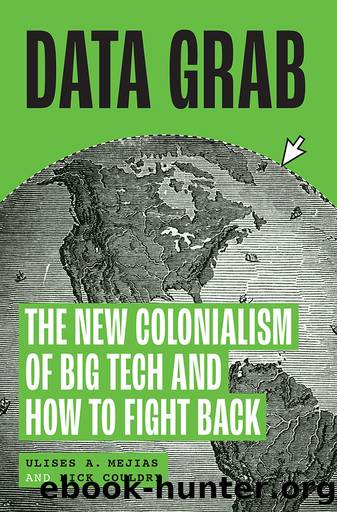Data Grab by Ulises A. Mejias

Author:Ulises A. Mejias
Language: eng
Format: epub
Publisher: University of Chicago Press
Published: 2024-07-15T00:00:00+00:00
Dataâs Lone Adventurers
The story of Big Tech, when seen the right way up, is really the story of data colonialism. The main characters are usually large entities (corporations, governments). But as with historical colonialism, individual adventurers play an important role too. They too can be conquerors or conquistadors, and engage in what one writer has called âsurveillance frontierismâ.100
A curious example of this occurred when in May 2022 two powerful men shook hands on a deal that they hoped could potentially bring them great benefits. One was Brazilâs then-president Jair Bolsonaro. The other was Elon Musk, president of Tesla and SpaceX, and now owner of Twitter. The handshake, sealed in a luxurious resort in Porto Feliz, signalled an intention for Muskâs Starlight satellites to bring the internet to 19,000 isolated rural schools, and to monitor the environment in the Amazon rainforests.. It is doubtful now the agreement will go forward under the administration of the new president of Brazil, Lula da Silva, but it casts a retrospective light on the ambitions of more than one type of adventurer. For the real purpose of this proposed deal, we might surmise, wasnât doing good to schoolchildren or the environment, but data extraction, plain and simple (meanwhile, Muskâs Starlink system is already being used by illegal miners in the Amazon).101
We met another adventurer earlier in the chapter: Australian Hoan T on-T hat, the brains behind Clearview AI, whose facial recognition app hit the headlines in January 2020.
Recall the appâs basic recipe. First, scrape billions of images from Facebook, YouTube, Venmo â in fact anywhere we are expected to show our face â and process them with high-level AI to distinguish those faces from each other in ever more precise ways. Then use the resulting metadata to support someone elseâs decision process. For example, the decision processes of an entity who wants to know whether this face, seen partially from an odd angle, is the same face that identified itself on that Facebook post. Finally, license the recipe to law enforcement agencies in the US and elsewhere, and you have a tool that the law could only dream of. Thereâs no evidence incidentally that Facebook, YouTube or any other platform anticipated this use of the billions of smiling faces they host, but then there was never anything in their platforms to stop it.
Ton-That saw nothing wrong at all with what he did. As an enterprising individual who, as he put it, âgrew up on the internetâ, Ton-T hat made exactly the same move that, on a smaller scale, Mark Zuckerberg performed as a Harvard student when he downloaded and used without permission his female peersâ portraits to create Facebookâs precursor: FaceMash.102 The lineage is clear, since neither saw this as raising moral issues. As Ton-That put it, this was just âthe best use of the technologyâ.103 And yet, Ton-That (and Zuckerberg) were also making the classic colonial move: grab everything because it is just there, ready for the taking.
Letâs put to one side the evidence
Download
This site does not store any files on its server. We only index and link to content provided by other sites. Please contact the content providers to delete copyright contents if any and email us, we'll remove relevant links or contents immediately.
Learning SQL by Alan Beaulieu(6283)
Weapons of Math Destruction by Cathy O'Neil(6270)
Digital Minimalism by Cal Newport;(5752)
iGen by Jean M. Twenge(5410)
Sapiens by Yuval Noah Harari(5368)
The Age of Surveillance Capitalism by Shoshana Zuboff(4287)
Elon Musk by Ashlee Vance(4123)
Thing Explainer by Randall Munroe(3932)
Apollo 8 by Jeffrey Kluger(3707)
Future Crimes by Marc Goodman(3596)
The Science Book (Big Ideas Simply Explained) by DK(3280)
The Innovators: How a Group of Hackers, Geniuses, and Geeks Created the Digital Revolution by Walter Isaacson(3178)
Who Can You Trust? by Rachel Botsman(3133)
I Live in the Future & Here's How It Works by Nick Bilton(2996)
Infinite Energy Technologies by Finley Eversole(2981)
Steve Jobs by Walter Isaacson(2896)
Dawn of the New Everything by Jaron Lanier(2770)
Chernobyl by Serhii Plokhy(2537)
Ben Franklin's Almanac by Candace Fleming(2528)
